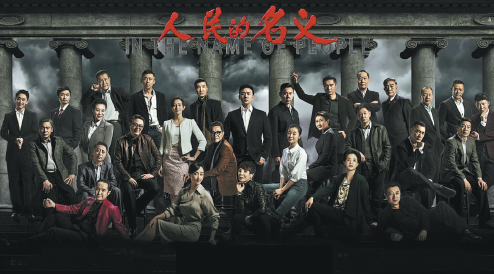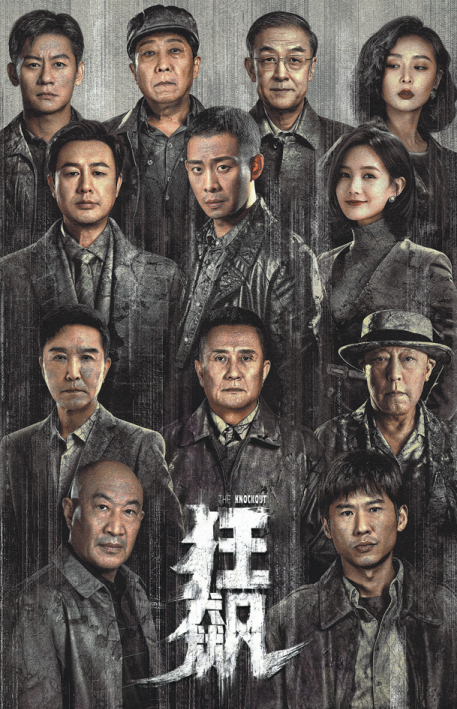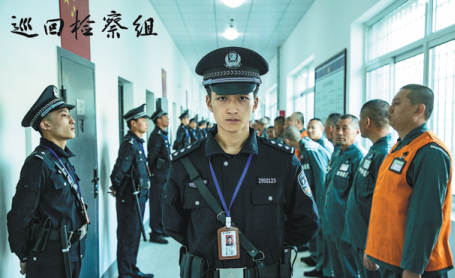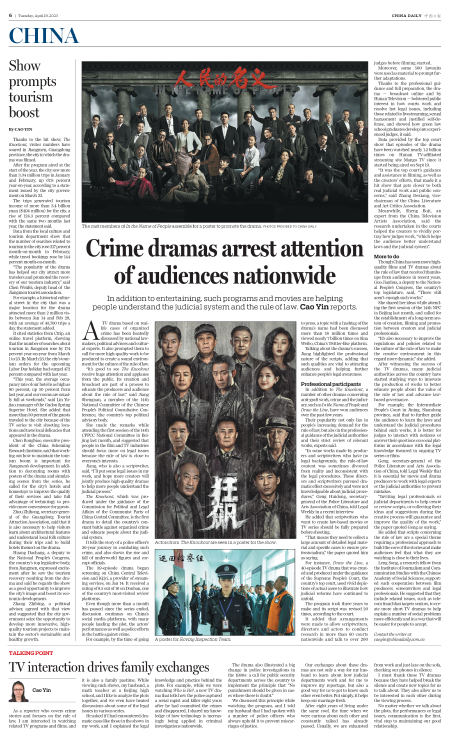
The cast members of In the Name of People assemble for a poster to promote the drama.

Actors from The Knockout are seen in a poster for the show.

A poster for Roving Inspection Team.
A TV drama based on real-life cases of organized crime has been heatedly discussed by national lawmakers, political advisers and cultural experts. It also prompted them to call for more high-quality work to be produced to create a sound environment for the culture of the rule of law.
"It's good to see The Knockout receive huge attention and applause from the public. Its creation and broadcast are part of a process to educate the producers and audience about the rule of law," said Jiang Shengnan, a member of the 14th National Committee of the Chinese People's Political Consultative Conference, the country's top political advisory body.
She made the remarks while attending the first session of the 14th CPPCC National Committee in Beijing last month, and suggested that people in the film and TV industries should focus more on legal issues because the rule of law is close to everyone's interests.
Jiang, who is also a scriptwriter, said, "I'll put some legal issues in my work, and hope more creators will jointly produce high-quality dramas to help more people understand the judicial process."
The Knockout, which was produced under the guidance of the Commission for Political and Legal Affairs of the Communist Party of China Central Committee, is the first drama to detail the country's constant battle against organized crime and educate people about the judicial system.
It tells the story of a police officer's 20-year journey in combating such crime, and also shows the rise and fall of underworld figures and corrupt officials.
The 39-episode drama began screening on China Central Television and iQiyi, a provider of streaming services, on Jan 14. It received a rating of 8.5 out of 10 on Douban, one of the country's most-visited review platforms.
Even though more than a month has passed since the series ended, discussion continues on China's social media platforms, with many people lauding the plot, the actors' performances as well as police efforts in the battle against crime.
For example, by the time of going to press, a topic with a hashtag of the drama's name had been discussed more than 18 million times and viewed nearly 7 billion times on Sina Weibo, China's Twitter-like platform.
Talking about the drama's success, Jiang highlighted the professional nature of the scripts, adding that such qualities are vital to attracting audiences and helping further enhance people's legal awareness.
Professional participants
In addition to The Knockout, a number of other dramas concerning anti-graft work, crime and the judiciary, such as In the Name of People and Draw the Line, have won audiences over the past few years.
Their popularity not only lies in people's increasing demand for the rule of law, but also in the professional guidance of the judicial authorities and their strict review of relevant works, experts said.
"In some works made by producers and scriptwriters who have no legal backgrounds, the rule-of-law content was sometimes divorced from reality and inconsistent with the legal procedures. Those directors and scriptwriters pursued dramatic effect excessively and were not knowledgeable about judicial procedures," Geng Huidong, secretary-general of the Police Literature and Arts Association of China, told Legal Weekly in a recent interview.
He added that scriptwriters who want to create law-based movies or TV series should be fully prepared before shooting.
"That means they need to collect a large amount of detailed legal material and specific cases to ensure professionalism," the paper quoted him as saying.
For instance, Draw the Line, a 40-episode TV drama that was created and produced under the guidance of the Supreme People's Court, the country's top court, used vivid depictions of actual cases to illustrate how judicial reforms have continued to unfold.
The program took three years to make and its script was revised 20 times, according to the court.
It added that arrangements were made to allow scriptwriters, directors and actors to conduct research in more than 60 courts nationwide and talk to over 200 judges before filming started.
Moreover, some 500 lawsuits were used as material to prompt further adaptations.
Thanks to the professional guidance and full preparation, the drama — broadcast online and by Hunan Television — bolstered public interest in how courts work and resolve hot legal issues, including those related to livestreaming, sexual harassment and justified self-defense, and showed how green law school graduates develop into experienced judges, it said.
Data provided by the top court show that episodes of the drama have been watched nearly 1.2 billion times on Hunan TV-affiliated streaming site Mango TV since it started being aired on Sept 19.
"It was the top court's guidance and assistance in filming, as well as the creators' efforts, that made it a hit show that gets closer to both real judicial work and public concerns," said Zhang Dexiang, vice-chairman of the China Literature and Art Critics Association.
Meanwhile, Sheng Boji, an expert from the China Television Artists Association, said the research undertaken in the courts helped the creators to vividly portray how judges work, "which helps the audience better understand laws and the judicial system".
More to do
Though China has seen more high-quality films and TV dramas about the rule of law that received thumbs-ups from audiences in recent years, Guo Jianhua, a deputy to the National People's Congress, the country's top legislature, said, "There still aren't enough such works."
She shared her ideas while attending the first session of the 14th NPC in Beijing last month, and called for the establishment of a long-term system of creation, filming and promotion between creators and judicial professionals.
"It's also necessary to improve the regulations and policies related to the culture of the rule of law to make the creative environment in this regard more dynamic," she added.
After witnessing the success of the TV dramas, many judicial authorities across the country have started studying ways to innovate the production of works to better educate people about the value of the rule of law and advance law-based governance.
For example, the Intermediate People's Court in Jining, Shandong province, said that to further guide the audience to learn the laws and understand the judicial procedures behind such works, it is better for judges to interact with netizens or answer their questions on social platforms in accordance with the legal knowledge featured in ongoing TV series or films.
Geng, secretary-general of the Police Literature and Arts Association of China, told Legal Weekly that it is essential for movie and drama producers to work with legal experts or the judicial authorities to prevent mistakes.
"Inviting legal professionals or judicial departments to help create or review scripts, or collecting their ideas and suggestions during the creative process will guarantee and improve the quality of the work," the paper quoted Geng as saying.
He added that scripts concerning the rule of law are a special theme requiring a professional approach to build the core of the stories and make audiences feel that what they are watching is close to their lives.
Leng Song, a research fellow from the Institute of Journalism and Communication Studies with the Chinese Academy of Social Sciences, supported such cooperation between film producers, screenwriters and legal professionals. He suggested that they include related issues, such as telecom fraud that targets seniors, to create more short TV dramas to help explain a number of social problems more efficiently and in a way that will be easier for people to accept.
Contact the writer at caoyin@chinadaily.com.cn

